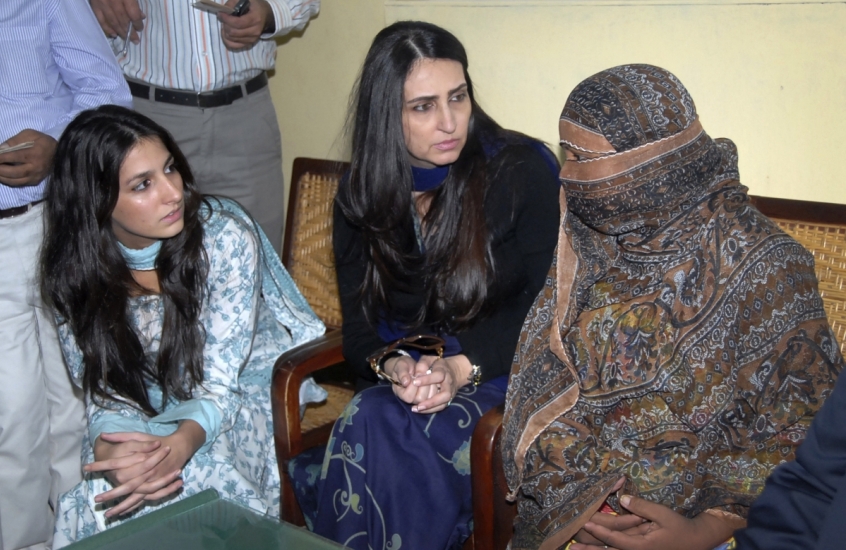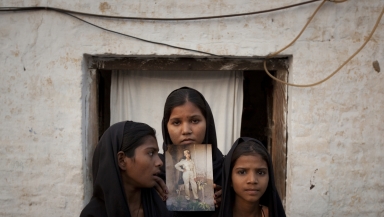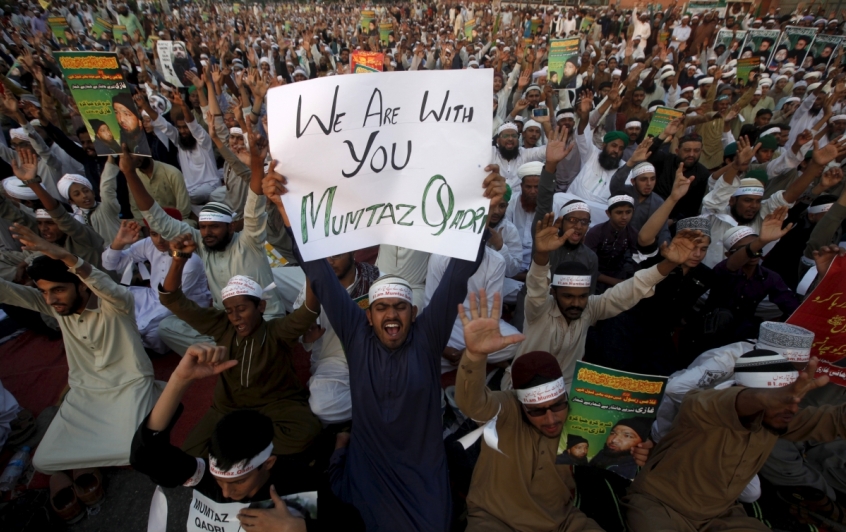
Asia Bibi, the Christian mother sentenced to death for blasphemy in Pakistan, will on Thursday face her final appeal. It was announced over the weekend that the date has been set for October 13, after years of postponement.
Who is she?
Bibi's actual name is Aasiya Noreen, though she has become better known as Asia Bibi through media coverage of her case. Bibi is a general term widely used in South Asia as a term of respect towards older women.
She is from Ittan Wali, a rural village in the Sheikhupura District of Punjab, eastern Pakistan – about 60 miles west of Lahore. She has five children, and before being arrested in 2009, worked as a farmhand to support her family. Her husband, Ashiq Masih, is a labourer.
What actually happened?
A row broke out between Bibi and a number of Muslim female colleagues in June 2009. They were picking berries together when the other women refused to drink from a water cup used by Bibi because she was a Christian and therefore deemed 'unclean'. Bibi reportedly said: "I believe in my religion and in Jesus Christ, who died on the cross for the sins of mankind. What did your Prophet Muhammad ever do to save mankind?"
Reports vary as to what happened in the immediate aftermath of the incident. Her husband told the New York Times in a 2010 interview that Bibi was immediately accused of blasphemy by her fellow workers. "Suddenly she saw men and women walking towards her with angry gestures," Masih said. "They started beating her and shouting that she had made derogatory remarks against the Prophet Muhammad".
Masih said the mob dragged his wife to the local police station where she was charged with blasphemy and jailed.
However, the BBC's Orla Guerin reports that it was not until a few days after the argument at the farm that Bibi was accused of blaspheming.
Whatever the exact timeline of events, campaigners are united in the belief that the charges levelled at Bibi are trumped up, and that she was falsely accused to settle a score.

Judge Muhammed Iqbal sentenced Bibi to death in November 2010. In a memoir written by Bibi and translated into English in 2012, she recalled the moment she was told of her fate: "I cried alone, putting my head in my hands. I can no longer bear the sight of people full of hatred, applauding the killing of a poor farm worker. I no longer see them, but I still hear them, the crowd who gave the judge a standing ovation, saying: 'Kill her, kill her! Allahu akbar!'
"The court house is invaded by a euphoric horde who break down the doors, chanting: 'Vengeance for the holy prophet. Allah is great!' I was then thrown like an old rubbish sack into the van... I had lost all humanity in their eyes."
Is this common in Pakistan?
Sadly, yes. At least 95 per cent of the Pakistani population is Muslim, and Islam is enshrined in the constitution as the state religion. The US Commission for International Religious Freedom last year said the country represented "one of the worst situations in the world for religious freedom" and accused the Pakistani government of failing to provide adequate protections for faiths other than Islam. It argued that repressive blasphemy laws in particular are used to target religious minorities.
These laws prescribe life imprisonment for the desecration of the Qur'an and the death sentence for "defiling" the Prophet Mohammad, and accusations of incidents have often prompted mob violence. According to the Centre for Research and Security Studies in Pakistan, more than 62 people have been killed in such incidents since 1990. More than 40 people are currently on death row for blasphemy, the majority of whom are members of religious minorities.
Bibi, however, is the first woman to be sentenced to death in Pakistan on blasphemy charges.
What has the reaction been in Pakistan?

Muslim hardliners have celebrated Bibi's conviction. The imam at the mosque in Bibi's village told the BBC that he cried with joy when she was sentenced to death, and pledged that even in the case of her being released on appeal, she would be punished. "If the law punishes someone for blasphemy, and that person is pardoned, then we will also take the law in our hands," Qari Mohammed Salim said.
A Muslim cleric has offered 500,000 rupees – about £4,000 – to anyone who manages to kill her, and she has reportedly been put into solitary confinement in her prison in Multan, eastern Pakistan, over fears she may be attacked by vigilantes.
Two prominent politicians, governor of Punjab Salmaan Taseer and minority affairs minister Shahbaz Bhatti, were assassinated in 2011 after defending Bibi. Her lawyer, Saiful Malook, is a Muslim who claims that Pakistani officials have been influenced by religious hardliners. He has also been targeted by Islamic fundamentalists.
What's the likely verdict on Thursday?
It's impossible to say for certain. The South Asia team leader at Christian Solidarity Worldwide (CSW), who remained anonymous for security reasons, previously told Christian Today that "if there is any hope of Asia getting justice, it's through the Supreme Court". Extremist groups have been present in the court room during Bibi's trials to date, which is a common occurrence in the lower courts as a way of intimidating the judge. However, this is not possible in the Supreme Court, where security is much higher.
Two years ago, the Supreme Court filed a move to review the human rights situation in Pakistan and recommended that the blasphemy laws be amended, again pointing to the possibility that Bibi's sentence could be appealed.
However, even high level judges are not immune to threats, which could affect Thursday's outcome, the CSW source said today.
"We've seen how politicians who have spoken up have been attacked. Salman Taseer and Shahbaz Bhatti, both killed in 2011, were directly involved in speaking out against the arrest and conviction of Asia Bibi. We have also seen and heard of cases where judges who are presiding over cases involving the blasphemy laws have received threats to their lives and have had to flee the country. So as much as the Pakistani Supreme Court would take a very objective approach, history has taught us that even judges at that level are open to discrimination and threats to their life".
Whatever the decision, there will be significant consequences, the source continued. If Bibi's sentence is upheld, making her the first women to be executed under the blasphemy laws, "it could set the trend" for more convictions, he said.
However, if she is released, there will be a significant outcry from Muslim hardliners. The execution in February this year of Mumtaz Qadri, who murdered Taseer, prompted huge street protests by Islamist supporters, who consider him a hero.
So there are real concerns that even if Bibi is set free on appeal, she will be targeted by vigilantes who want her to pay for her alleged crime. "One of the reasons there is a mentality of impunity is simply because the existing laws give open license for religious fundamentalists in Pakistan to act without fear, and to taken the law into their own hands," the source said. "Oftentimes, even if someone is released, that the person will receive the brunt of fundamentalists outside the court.
"Even if Asia Bibi is released, there will definitely be outrage on the streets," he added.
What can we do?
Campaigners are urging Christians to pray for Bibi's release ahead of Thursday's appeal. CSW has launched a 24/7 prayer for supporters, and Release International is calling on the Pakistani government to repeal the blasphemy laws – a petition can be signed here.
It's also vital that the UK government holds Pakistan to account, the CSW source said. "It's important for the British government to maintain its call on Pakistan to ensure that the blasphemy laws are re-looked at," he said. "It's important that the UK government calls on the Pakistani government to address this issue, to amend the laws, [especially those that] give a free hand to religious fundamentalism."













